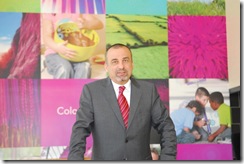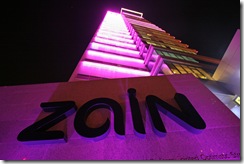Abdul Malek Al Jaber is an executive who has to divide his time between overseeing the operational activities of Zain’s presence in Jordan, at the same time as he acts as the chief operating officer of Zain Group’s pan-Arabian business. In many ways the country and group functions are similar, though the challenges a standalone Zain Group faces at this point in time are more acute than in any of its standalone country markets
Al Jaber holds the dual roles of being the CEO of Zain Jordan as well as being the chief operating officer of Zain Group
A theme that cuts across Zain, from its group headquarters in Kuwait, to its seven-strong (including Saudi Arabia for the meantime) individual markets, is the transformational stage mobile operators find themselves in as the data revolution takes the industry in a completely new direction.
In Jordan, Zain’s CEO, Abdul Malek Al Jaber says companies such as his can no longer operate purely as mobile operators. “We need to become a service provider, and identify the needs of the customer through profiling and segmentation,” Al Jaber says. “We need to become a telecom services provider, offering a full range of telecom services including fixed, mobile, data, hosting, and managed security services.”
Al Jaber is a big believer in cooperation and partnership within the telecom value chain, and where the telco itself does not have a direct route to market, he embraces partnering and allying with those parties that can.
In a commentary of the overall state of the telco market, Al Jaber talks of how the old-style business model for network operators was one based on access, and this mindset has had to change. In Jordan, Zain has paired its mobile network assets with the deployment of a fibre optic network, for example. The telco has also invested in a wireless broadband pre-LTE HSPA+ network, offering nationwide coverage.
There are six licensed WiMAX operators in Jordan, and Al Jaber believes 30-40 per cent of the population is being targeted by the country’s wireless broadband providers, with take-up amongst WiMAX subscribers at least, having been less than spectacular.
Zain Jordan instead, has focussed the deployment of 3G services, which it launched in March, in areas and segments that have until now been largely ignored by the other wireless broadband providers.
“We believe in white labelling and opening up our network to Internet service providers (ISPs) and smaller players,” says Al Jaber. “If you look at the first two months after we launched 3G, you will see that the number of subscribers we were able to add in that time exceeds the number that all the WiMAX operators combined were able to add in five years of operation. We crossed 100,000 unique, post-paid broadband subscribers after two months, while there are only around 60,000 WiMAX users.”
Al Jaber says the take-up rate of HSPA+ exceeded even the most positive business projections the company had prior to launch, and believes its two main competitive advantages in this area are in the quality of service it provides, as well as the offer of nationwide coverage from launch.
Orange Jordan enjoyed an exclusivity period on 3G of just less than 12 months, having launched its service in March 2010. However, Zain Jordan has quickly made up ground, and while Orange reported 3G subscriber numbers of over 300,000 in the middle of February 2011, 11 months after launch, Zain Jordan claims to have matched this number in under a quarter. Towards the end of May, Zain Jordan claimed a total of around 350,000 3G users, with 100,000 subscribers utilising mobile data via dongles, and the remaining 250,000 subscribers using the HSPA+ network via their smartphones.
“We are not selling connectivity, we are selling services,” comments Al Jaber. “Mobile financial services, enterprise solutions, solutions for SMEs; these are the types of services that interest users and generate revenue for the operator,” he adds.
A significant concern that had been expressed by Orange Jordan CEO, Nayla Khawam in the lead-up to Zain Jordan’s 3G launch was with respect to the brutal price competition that exists in the voice arena permeating into the 3G realm. “Quality of service is the game I want our competitor to play, not prices,” Khawam said before Zain entered the 3G market. “The threat that the game that is played in voice being played in 3G is a concern,” she added.
Al Jaber acknowledges that the historical price wars in Jordan have caused severe “bleeding” on the part of competitors, though he believes Zain Jordan’s strategy to focus on retention efforts, embark on targeted subscriber acquisition, and develop new revenue streams, keeps the telco in positive territory.
In the context of Jordan, Zain has taken a clear strategic decision to focus on higher-ARPU subscribers in its base, outsourcing the management of lower-end/ lower margin subscribers to its re-seller MVNO partner Friendi Mobile.
“We do not want to enter a price war, and as such have identified certain segments that Zain does not focus on directly, but through our partners instead,” says Al Jaber. “Friendi Mobile, our partner for customers with restricted budgets, has been very successful. There are 700,000 Egyptian workers in Jordan, and within a month of launch Friendi had 70,000 subscribers from within this niche market,” he adds.
Jordan remains the most competitive market in the Arab world, with a mobile penetration rate in excess of 100 per cent, four mobile operators and one mobile re-seller serving a population of fewer than seven million inhabitants. In order to succeed under such conditions Zain has been formulating a new strategy that does not only manifest in Jordan but across the entire group. 
Zain tower in Bahrain
“Our new strategy is innovation based,” reveals Al Jaber. “There was a combination of organic and inorganic expansion before Zain Group’s sale of its African assets, which was the turning point. We are still ambitious to emerge as a global operator, but this ambition has a new tagline, which is innovation.”
Zain’s innovation drive is based on a 360 degree understanding of customers, with the view to providing them with services that include content, financial services, and mobile healthcare.
“We are looking to become the operator of choice in the introduction of new and modern telecommunications services,” asserts Al Jaber.
“The name of the game is being focussed. Aligning and allying with market leaders into adjacent areas is key,” says Al Jaber. “A customer prefers a one-stop shop, and we want to be able to offer that. So what we are doing is based very much on remaining focussed.”
In Jordan, as in other markets, such a shift in strategy would see Zain come into direct competition with national telco incumbents, which run a number of activities including fixed, mobile, data, and sometimes even satellite networks. Orange Jordan was the first incumbent telco in the region to articulate and implement a strategy towards becoming an integrated operator, though Al Jaber believes in reality it is a difficult type of organisation to manage.
“Incumbent operators by default cannot run as efficiently as private players,” says Al Jaber. “I come from a background of working within an incumbent, and I know how difficult it is to try to align data, fixed line and mobile activities. Typically quality of service is bad, and the prices offered to enterprises and SMEs are often exorbitant,” he adds.
The failure of Etisalat and Zain to ratify the acquisition of the latter by the former left the Kuwait-based player needing to reassess its future as a standalone entity, and define what that represented. However, speculation remains around the future of Zain, with there being suggestion Etisalat may look to table a lower bid for the group, or that individual assets may be sold off a piece at a time.
“Being an acquisition target, or the subject of speculation is good news not bad news,” says Al Jaber. “We have a fantastic brand name, and are the largest operator in the Arab world. Soon the market will learn about our new strategy, and about our market leadership in innovation. We have an excellent future,” he concludes.





5 comments ↓
Interesting talk sir, keep that up! I agree that Zain’s strategy is innovation based.
Innovation is the main point… the ability to deliver innovative ideas is the challenge you find, Dr. Al-Jaber.
I learn from him, and admire his ambition.
Very interesting and useful, thank you for sharing this. You always impress me as an example of a successful genius in communication.
Loyal Zain employee.
I am proud I am from the Zain family (ISP). I am proud because you are my CEO.
I wish you further progress and success
Abdul Malek Al Jaber , like a star that shines in the sky
Leave a Comment